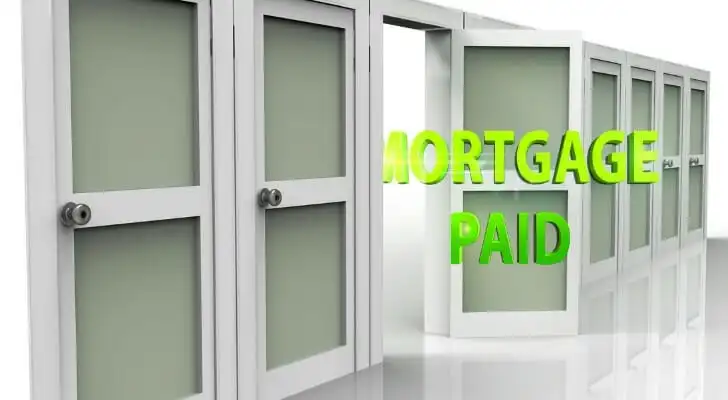For many homeowners, one of the milestones on the path to financial independence is being able to pay off their mortgage. With typical mortgages lasting 30 years, it can take a long time to meet this goal. But what happens when you pay off your mortgage? There are, in fact, a number of steps to making your final mortgage payment and figuring out what to do next. Consider working with a financial advisor as you work toward your financial goals and overall independence.
How to Pay off a Mortgage
When you’re ready to pay off your mortgage, follow these steps to accomplish your goal. Keep in mind that because of accrued interest, the balance on your mortgage statement isn’t the payoff amount. Contact your lender online or over the phone to request a payoff statement.
The mortgage company will send you a letter with a payoff amount through a specific date. This amount includes accrued interest through a certain date. Pay the amount due by the due date or expiration of the payoff statement to eliminate your mortgage. Any excess amount that you pay will be refunded.
Since most mortgages have property taxes and homeowners insurance premiums included in the monthly payment, there will be an amount leftover when your mortgage is paid off. Request an escrow account refund and set that money aside to pay those bills when they come due.
What Happens When You Pay off Your Mortgage?
Once your final payment is made, there are certain actions that the mortgage company and you should make to formalize this milestone.
- Receive mortgage documents: The mortgage company will send you a canceled promissory note, updated deed of trust and certificate of satisfaction. These documents prove that your mortgage is paid off. Save them in a secure location.
- Stop automatic payments to your mortgage company: Ensure that any automatic payments you’ve established have been canceled. With your mortgage paid off, you do not have to send the mortgage company any more money.
- Send discharge of mortgage letter to your county: Your mortgage company should send all of the required documents to your county clerk’s office notifying them that your home is no longer bound by a mortgage. If they have not within 90 days, bring your mortgage documents to the clerk to update their records.
- Notify your insurance company: Contact your insurance company to let them know that your mortgage has been paid off. They may require a copy of your mortgage documents to verify that this is true.
- Celebrate this milestone: This is a momentous occasion, so take the time to celebrate it with your significant other, family and friends.
Managing the Ongoing Expenses of Your Home

Even though your mortgage is paid off, that doesn’t mean that you no longer have any house expenses. It is a good idea to set aside savings accounts for each of these ongoing expenses. Property taxes are typically a portion of the value of your home and are paid near the end of the year. Assuming that your home continues to increase in value, this bill will also increase each year. This bill varies based on the type of home you have, coverages and deductibles selected, recent claims and other factors. While you can pay monthly, you’ll often save money by paying it once a year.
Some homes are in communities with homeowners associations that charge dues. These dues are often monthly or quarterly. It is recommended that you set aside 1% of your home’s value for repairs and maintenance. Even if you don’t spend that much each year, you’ll need the excess for bigger projects. These could include things like replacing a roof or painting your home.
Styles and tastes vary over the years, so you may want to set aside money to pay for larger projects, like updating bathrooms, remodeling the kitchen and replacing windows.
What You Can Do With Your Extra Money
When you pay off your mortgage, you’ll suddenly find yourself with more money each month. Depending on your financial plan, some or all of these steps may be useful:
- Focus on paying off debts: If you have other debts, “snowballing” your mortgage payment towards the next debt can accelerate its payoff.
- Build your emergency fund: Experts recommend having an emergency fund that is three to six months of your monthly expenses. The good news is that the number is much smaller now that you’ve eliminated your mortgage payment.
- Max out your retirement plans: If you’re not doing so already, putting extra money towards maxing out your company retirement plan and traditional or Roth IRA is a great idea. This is especially true for investors 50 and over who have access to “catch-up” provisions.
- Invest in a brokerage account: When your retirement accounts are set, investing in a brokerage account enables you to invest without locking up your money until you reach retirement age.
- Increase your insurance coverage: Many homeowners do not have adequate life, long-term care or disability insurance coverage. Speak with a financial advisor to determine what number you need to meet your goals.
- Contribute to college savings accounts: If you have kids or grandkids, helping them out with their college expenses may be a goal of yours. Contributing to a Coverdale Savings Account or 529 plan is a good way for that money to grow tax-free for education.
Strategies for Paying off Your Mortgage Quickly
Most homeowners make all of their payments according to the mortgage schedule. But there are other ways that you can accelerate the payoff of your mortgage ahead of schedule.
- Bi-weekly payments: Bi-weekly payments allow you to pay half your mortgage payment every two weeks instead of once a month. This also makes it so you pay one extra payment each year, which shaves off about four years from the standard 30-year mortgage.
- Lump sum payments: In addition to making the normal monthly payment, some homeowners pay extra when they can. Examples include tax refunds, annual bonuses, inheritances and other unexpected windfalls.
- Rounding up payments: By rounding up your mortgage payment to the next $100 (or more), you’ll be paying extra towards the principal of your mortgage every month. Most homeowners won’t miss the additional payment out of their monthly budget.
- Mortgage payoff fund: Instead of paying extra towards your mortgage, you can set up an investment account dedicated to your mortgage. You’ll add extra money to this account to earn stock market returns – provided those returns exceed your mortgage interest rate. At some point in the future, you can cash out this account and pay off your mortgage if you’d like.
Bottom Line

Paying off your mortgage is a goal that many homeowners dream of. When you pay it off, there are certain steps you should take to formalize it. Additionally, now that your mortgage is gone, you’ll have extra money to use on your other goals. But, you also need to set aside money for ongoing expenses, like property taxes and insurance.
Tips for Paying off Your Mortgage
- Financial advisors can recommend investments that reduce taxes and earn higher returns so that you have more money to pay off your mortgage. Finding a qualified financial advisor doesn’t have to be hard. SmartAsset’s free tool matches you with up to three financial advisors who serve your area, and you can interview your advisor matches at no cost to decide which one is right for you. If you’re ready to find an advisor who can help you achieve your financial goals, get started now.
- Do you have a good grip on what the current rate environment looks like for mortgages? Use SmartAsset’s mortgage rates page to learn more.
- One of the best tips for paying off your mortgage is to avoid buying a home that’s beyond your budget. It’s easy to get caught up in the excitement of buying a home and spread yourself too thin. Use our calculator that helps you determine how much house you can afford based on your finances.
Photo credit: ©iStock.com/Fly View Productions, ©iStock.com/stuartmiles99, ©iStock.com/courtneyk
